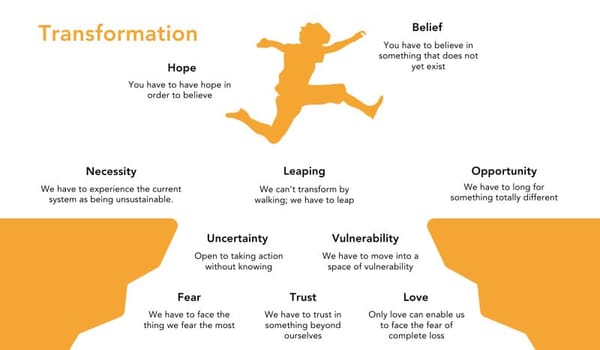Existentialist Philosophy in Team Management: A Path to Authentic Collaboration
Discover how existentialist philosophy can transform your team dynamics. Embrace freedom, manage anxiety, and create meaning together.

In the dynamic world of teamwork, why do we collaborate? Is it merely to accomplish common goals, or is there a deeper purpose, a quest for meaning and authenticity in our team dynamics? In today's fast-paced professional landscape, it's easy to lose sight of the latter. But what if we could find guidance in an unlikely place: existentialist philosophy?
The Existentialist Perspective on Teamwork
A. Freedom and Responsibility
Existentialist philosophers like Jean-Paul Sartre and Simone de Beauvoir argued that humans are fundamentally free beings, responsible for creating their own meaning in life. In team settings, this translates to embracing the freedom to contribute and accepting the responsibility that comes with it.
As a team member or leader, you're constantly faced with decisions that shape your team's dynamics. Embracing your freedom means acknowledging that your choices influence the team's direction, and that you're responsible for your part in its outcomes. This can be daunting, but it's also empowering. It's about recognizing that you have the power to shape your team's culture, processes, and ultimately, its success.
B. Anxiety of Choice
With great freedom comes great anxiety. The abundance of choices in teamwork can lead to paralysis, as we grapple with the weight of our decisions. Existentialists call this angoisse, or anxiety.
But anxiety isn't something to be avoided; it's a natural byproduct of our freedom. Instead of trying to eliminate it, we should learn to manage it. Recognize that uncertainty is inherent in teamwork, and that making decisions despite the anxiety is a sign of strength, not weakness.
C. The Paradox of Choice
In team settings, the paradox of choice can manifest as a struggle to reach consensus or make decisions. With so many perspectives and ideas at play, it can be challenging to find a path forward.
Existentialist philosophy suggests that this is not a problem to be solved, but a reality to be embraced. Each team member brings a unique perspective, and it's through the collision and integration of these perspectives that true innovation and growth occur.
Teamwork as a Quest for Meaning
Teamwork is often portrayed as a means to an end, a way to achieve common goals. But it's also a deeply personal journey. It's about creating meaning out of challenges, forging an authentic path in the face of adversity.
Think of your team dynamics as a quest, a journey to discover and express your unique purpose within the team. Each challenge, each setback, is an opportunity to make authentic choices that bring you closer to that purpose.
Personal Experience: When I've led teams using this approach, we've consistently seen improved results. By focusing on authenticity, freedom, and personal growth, we've fostered a culture of trust and collaboration that's driven our success. For instance, when migrating teams to new projects, we've seen more acceptable results when we apply these principles.
Applying Existentialist Philosophy to Your Team
So, how can you apply these principles to your own team?
- Embrace Your Freedom: Acknowledge your freedom to contribute and accept the responsibility that comes with it. This means taking ownership of your role, your tasks, and your decisions.
- Manage Anxiety: Recognize that anxiety is a natural part of teamwork. Don't try to eliminate it; learn to manage it. This could involve mindfulness practices, open communication, or seeking support from colleagues or mentors.
- Forging an Authentic Path: Make choices that align with your values and purpose within the team. Remember, your team dynamics are a quest for meaning. This could involve advocating for your ideas, challenging the status quo, or finding ways to integrate your personal passions into your work.
- Empower Others: Encourage your teammates to embrace their freedom, manage their anxiety, and forge their own authentic paths. This could involve creating a safe space for open dialogue, facilitating team-building activities, or providing opportunities for professional development.
- Embrace the Paradox of Choice: Recognize that the diversity of perspectives in your team is a strength, not a weakness. Foster an environment where everyone feels heard and valued, and where decisions are made through open dialogue and consensus.
Case Study: Retronify
At Retronify, our philosophy is deeply rooted in existentialist principles. We believe that teamwork is about more than just productivity; it's about creating meaning, forging an authentic path, and helping others do the same.
Our approach emphasizes authenticity, freedom, and personal growth. We don't believe in cookie-cutter solutions; we believe in empowering individuals to make their own choices, to create their own meaning. This philosophy isn't just something we preach; it's something we live. It's reflected in our team culture, our decision-making processes, and our interactions with clients.
In a world that often reduces teamwork to mere productivity, existentialist philosophy offers a refreshing perspective. It reminds us that our ultimate destination isn't a place, but a state of understanding and coexistence. It's about forging an authentic path, creating meaning, and empowering others to do the same.
Ready to start your quest? Let's work together to apply these principles to your team. Whether you need consulting or mentoring, I'm here to help. Reach out today, and let's forge an authentic path together.




